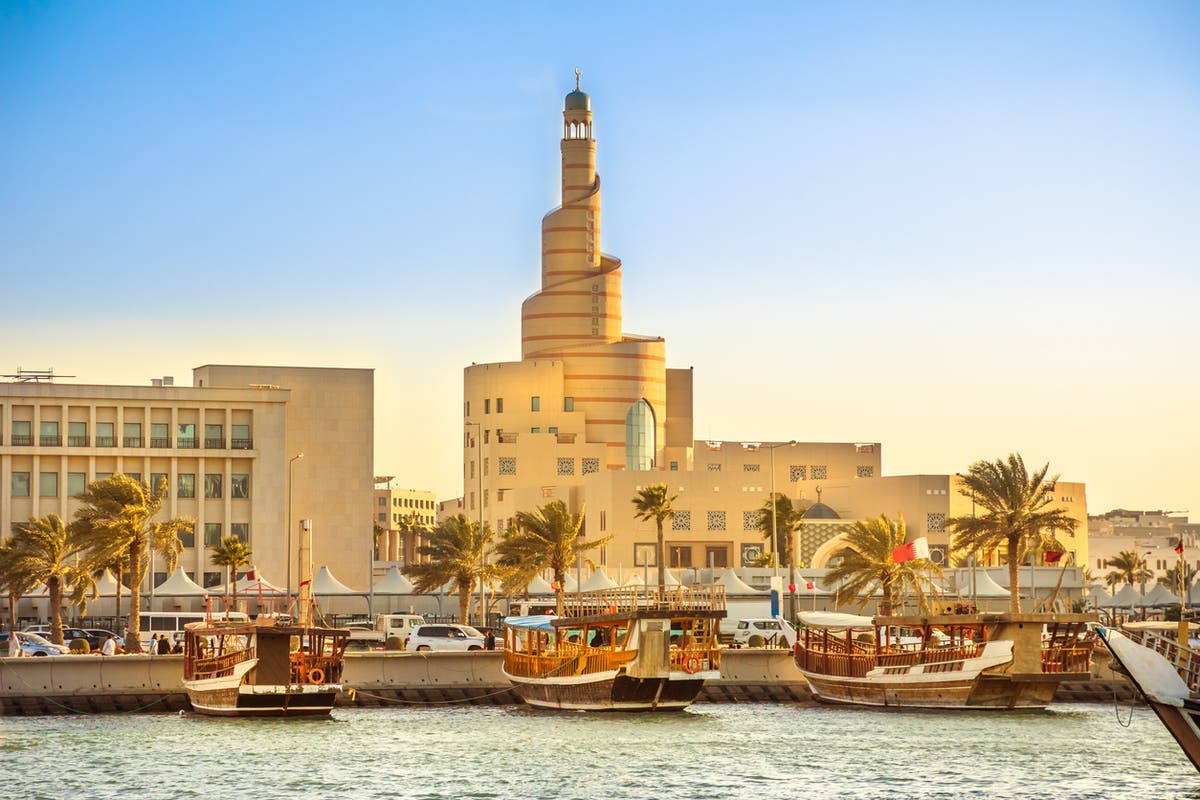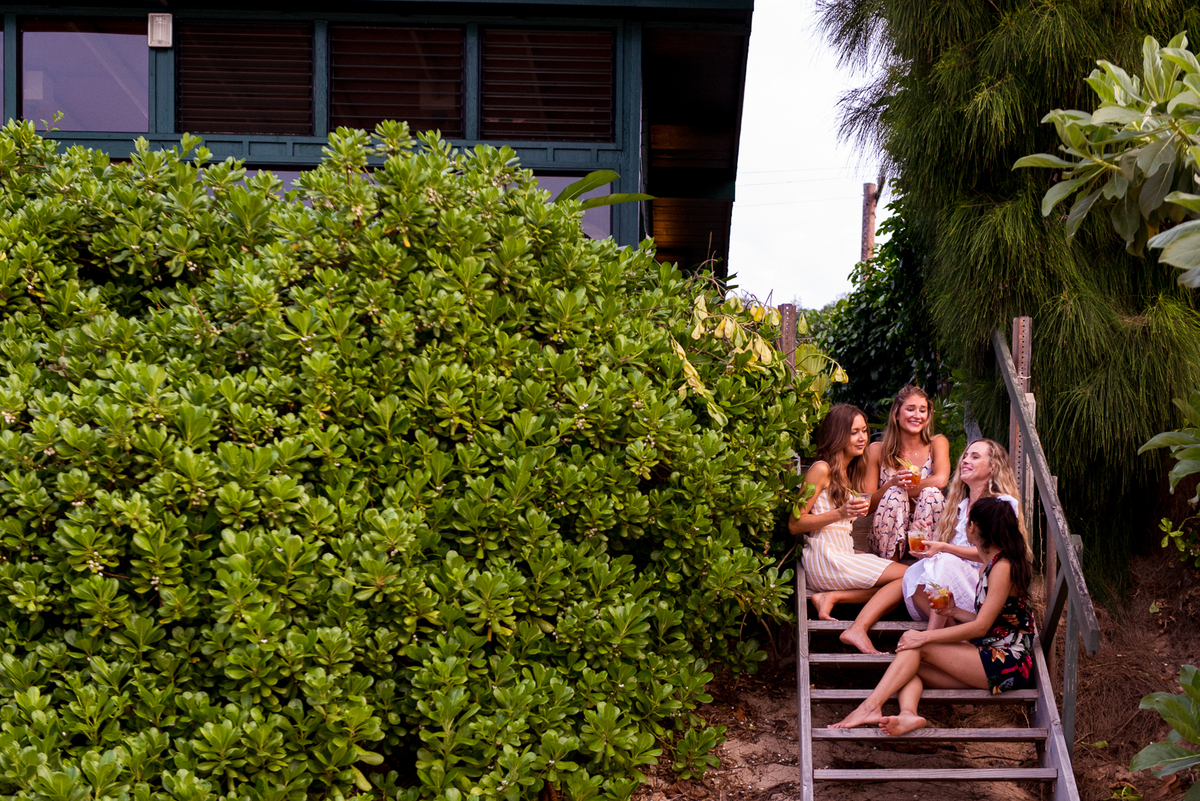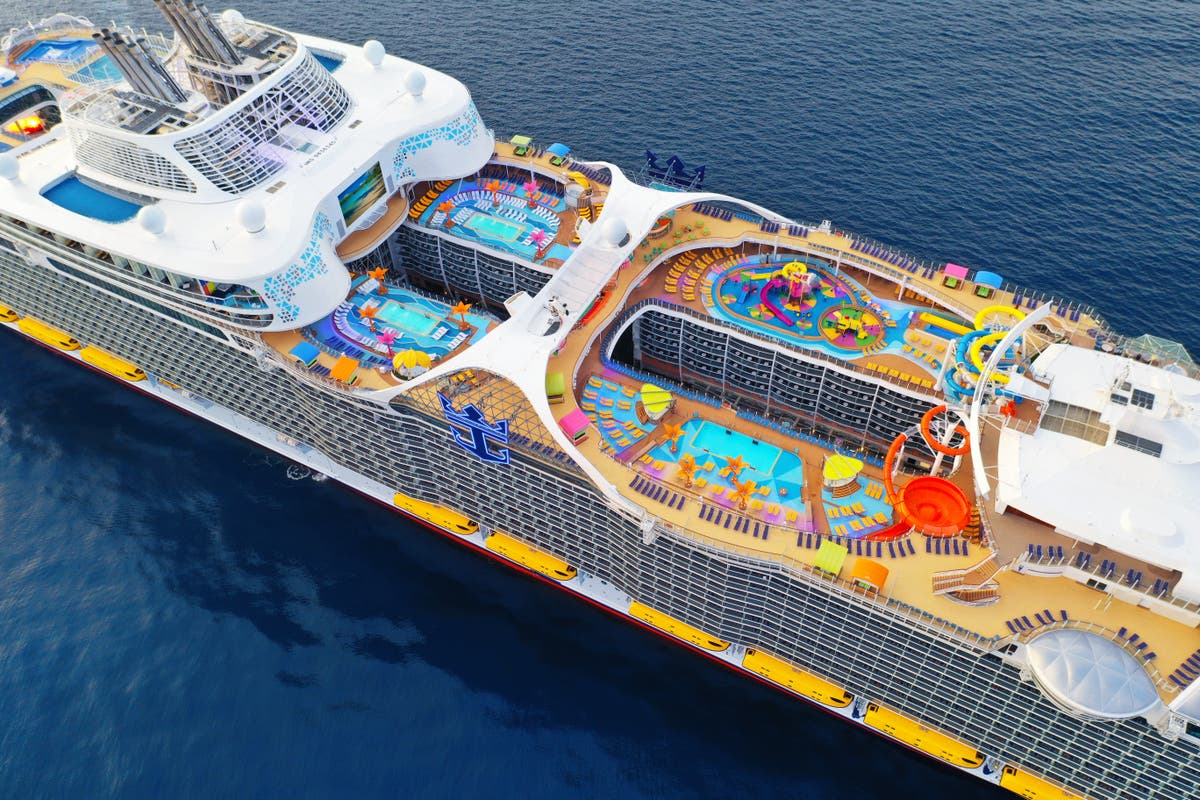World Cup travel survival kit: Everything you need to know about Qatar 2022
No one is quite sure what will happen about alcohol sales – Simon Calder reports on what we know so far

How did a country with no significant footballing tradition, no suitable existing infrastructure and a climate completely unsuited to a summer tournament – but with almost limitless cash – procure the right to host one of the world’s greatest sporting competitions? One day the full story may emerge,
It is difficult to conceive of a less appropriate nation to be the sole venue for the 2022 Fifa World Cup – an honour bestowed on Qatar in 2010.
In March 2015, Fifa announced that the tournament would be played in early winter to avoid the intense summer heat, even though it meant ripping the heart out of European football seasons to accommodate the shift.
Ahead of kick-off on 21 November, stadiums are being completed around the nation. An unknown number of migrant workers have died during the constructon of infrastructure for the tournament. Sacha Deshmukh, chief executive of Amnesty International UK, said: “Migrant worker deaths are casting a long shadow over the 2022 World Cup.”
Human Rights Watch says Qatari law “discriminates against women in marriage, divorce, child custody, and inheritance”. The Foreign Office says: “Homosexual behaviour is illegal in Qatar.”
The traditional multinational camaraderie that every World Cup fosters – most recently in the highly successful Russia 2018 – will be largely absent. More prosaically, fans still don’t know the exact rules about getting a beer.
Yet since Qatar 2022 is going ahead, all we can do is try to make the best of it. This is your essential survival kit.
Just remind me about Qatar?
The host of the World Cup 2022 is a thumb of territory barely half the size of Wales protruding from the Arabian peninsula into the Gulf.
Doha, the capital, is on the same latitude as Miami and Hong Kong, and the same longitude as Tehran and Baku. It shares a land border with Saudi Arabia and is close to Bahrain, with Abu Dhabi in the UAE 200 miles east and Dubai slightly further.
The UK is about 3,300 miles away – roughly seven hours’ flying time.
The Supreme Committee for Delivery & Legacy – the Qatari body organising the tournament – says the “compact nature” of the tournament will have a positive impact on players and fans.
The organisation says: “Not only will fans be able to watch more than one match in a single day, they will also avoid the long journeys to other matches seen in previous Fifa World Cups – where some games were played thousands of miles apart.”
When does it start and end?
The opening match – and Qatar’s first-ever World Cup game – kicks off against Ecuador at 1pm local time (10am GMT) on 21 November 2022 at the Al Bayt Stadium in the town of Al Khor, in the northeast of Qatar.
The final is at 3pm local time (12 noon GMT) on 18 December at the Lusail Iconic Stadium, north of Doha.
What awaits England and Wales ?
Both home teams are in Group B, along with Iran and the USA. All Group B games will take place on 21, 25 and 29 November.
How do I get there, and how much will it cost?
Direct flights on Qatar Airways – supplemented by its partner, British Airways – will operate from London Heathrow and Gatwick, Birmingham, Cardiff, Edinburgh and Manchester. They will touch down at Hamad International Airport in Doha – one of the big Gulf hubs, coded DOH.
During the World Cup, the old Doha International Airport (DIA) is being brought back into use by airlines including Etihad Airways, Flydubai and Pegasus Airlines of Turkey.
Fares are falling for direct flights. In the summer, the fare for departure from London Heathrow on 19 November (a couple of days before the first Group B matches) and returning on 19 December (the day after the final) was upwards of £1,200 return. By October, the lowest fare was £934 – presumably because bookings were not coming in as fast as expected.
However, fares towards the end of the tournament may increase because of demand from regular tourists – not football fans – flying long-haul via Doha for Christmas.
Any cheaper alternatives?
Lower fares for connecting flights are available on a wide range of airlines via their hubs: Turkish Airlines via Istanbul, Egyptair via Cairo and Royal Jordanian via Amman. Typical fares are £800 return.
There are not yet particularly good deals on the Gulf-based carriers such as Etihad, Gulf Air and Emirates via Abu Dhabi, Bahrain and Dubai. Because lots of supporters will be staying outside Qatar and just flying in for matches, that will put pressure on prices.
Any red tape?
Yes. Your passport should be valid for a minimum of six months from the date you arrive. In addition, anyone travelling to Qatar from 1 November 2022 must have an approved “Hayya Card”. Hayya means “let’s go”. You can choose a physical version of this ID card, or stay with the online version.
“This requirement may continue up until 23 January 2023 and applies to all visitors,” the Foreign Office says.
To get this identity document at present, you must have at least one match ticket – which currently rules out people who want to be in Qatar to soak up the atmosphere, or to be a tourist or business visitor.
Where will I stay?
The Supreme Committee for Delivery & Legacy expects 1.5 million visitors during the World Cup.
In 2019, Qatar had 35,000 hotel rooms. But the Qatari government is adding 105 new hotels and serviced apartments aimed at providing 100,000 rooms.
To put the number in context, though, that will still be fewer than the city of Sochi – just one of the dozen venues for the Russia 2018 World Cup.
The peak dates for travelling fans are expected to be 27 and 28 November, towards the end of the group stage, with 275,000 fans in the country.
The accommodation search function provided by the Supreme Committee allows fans to find rooms in a wide range of hotels.
Many hotels are sold out. A relatively budget alternative is the “Fan Village Cabins” in the Free Zone near the old airport. They appear to be well-appointed containers, with double or twin en-suite bedrooms.
The organisers say: “Amenities in each cabin include tea and coffee making facilities, two bottles of water per day, a fridge, bed linen and bathroom towels.”
There is a Metro station nearby. The nightly rate is 740 rials (£175).
There are also cabins aboard cruise ships moored in Qatar for the event: MSC’s Poesia and World Europa. A two-night stay for a cabin sleeping up to three people is on sale for £1,075.
These options are open only to people with match tickets. They can also look on the wider open market, but hotel rates are very high – typically £1,500 nightly.
Could I stay in a nearby country?
Yes, and this is likely to be an economy option. Dubai has by far the highest number of hotel rooms. Qatar Airways is running special Match Day Shuttle flights at a fixed fare: US$258 (£221) return in economy class or US$99 (£856) in business class. You can take only cabin baggage. The flights operate from Dubai World Central (DWC), not the main airport (DXB).
Similar shuttles at the same fares are available from Muscat in Oman (operated by Oman Air but sold by Qatar Airways), which may be a more aesthetically appealing location in which to be based.
Saudi Arabia, which has a land frontier with Doha, is a lower-cost option. But accommodation options anywhere near the border are limited.
How will I get around?
The maximum distance between any of the eight stadiums is 45 miles (75km), and all public transport will be free to fans on match days.
Doha has a new and formidably good Metro system. Travelling from the airport into the capital and onwards to Lusail Iconic Stadium – at the end of the line, and venue for the final – is easy.
The hub of the three-line network is Msheireb (sometimes spelt, and always pronounced, Musheireb) in the heart of Doha. All three lines – red, green and gold – meet. Some say it is a palatial take on the grandiose mid-20th century Soviet Metro stations.
Buy a travelcard on arrival at the airport for 10 rials (about £2) and load it as you go along: each journey is 2 rials (40p) but daily use is capped at 6 rials (£1.40).
Sophisticated travellers might choose to go for Gold Club on the Metro, for which the travelcard costs 100 rials (£20) and each journey is 10 rials (£2.40). You can expect a feast of subterranean bling – including white leather seats – and, with fares five times higher than standard, a near-empty carriage.
Another carriage is reserved for families, in which men are allowed only if they are travelling with a woman.
The same travelcard works on the Lusail tram system.
Qatar has a good bus network. No cash or direct payment is allowed; you must buy a “Karwa” stored value card. The “Classic Card”, price of 30 rials (£7.20) includes 20 rials (£4.80) worth of journeys, which is more than enough for a return trip between Doha and the northern town of Al Khor, home to one of the key stadiums.
Buses have video screens that show exactly where you are, the next stop and the expected time at the terminus – and even the name of the driver and the speed at which he is driving.
The Hayya Card acts as a pass for free public transport on the day of matches.
Uber has an excellent network of drivers and cars, with very low rates: a ride from Doha to Al Khor is about 50 rials (£12).
There is also an open-sided, battery-powered tram that runs anticlockwise on a circuit through the Msheireb district of central Doha, providing a shady and refreshing 15-minute adventure.
How do I get a match ticket?
Well-heeled fans can lock into their team’s matches – but it will cost thousands of pounds to “curate your Fifa World Cup 2022 experience”.
To guarantee a seat at each of England’s or Wales’s three group matches, plus the round of 16 and quarter-final, costs $11,250 (£9,650).
Fifa is in theory selling tickets online, but as of 1 October all 64 matches are shown as sold out.
What will I eat and drink?
Qatar has superb restaurants, ranging from classic Middle Eastern cuisine to options from the Indian sub-continent. There are also some outstanding venues catering for Westerners, such as Boho Social – just north of Katara Cultural Village, itself north of Doha.
But drinking alcohol is not possible at this or other stand-alone restaurants at present. Alcohol is currently available in hotels (including their restaurants), and will be served at fan zones during the tournament.
The Supreme Committee says: “Alcohol is not part of Qatari culture, and may not be available everywhere, but it will be available in designated areas.
“Fifa will work with Q22, as it does with all Fifa World Cup host nations, to find a solution that satisfies everyone concerned.”
It is illegal to drink alcohol – or be drunk – in public, with the Foreign Office warning that drunkenness “could result in a prison sentence of up to six months and/or a fine up to QAR3,000 (over £600).
Anyone staying in Saudi Arabia will not be able to drink while in the kingdom.
Is there a dress code?
Yes, according to the Qatar Tourism Authority. It says: “Visitors (men as well as women) are expected to show respect for local culture by avoiding excessively revealing clothing in public.
“It is generally recommended for men and women to ensure their shoulders and knees are covered.
What about behaviour?
The tourism body says: “Showing overt affection and intimacy in public is frowned upon.
“Qatari ladies will not shake hands with men, and many men will not shake a lady’s hand as a gesture of respect.”
The Foreign Office warns: “Homosexual behaviour is illegal in Qatar.” Article 296 of the Qatari legal code stipulates imprisonment of between one and three years for “leading, instigating or seducing a male by in any way to commit sodomy”.
It adds: “Private life in Qatar is largely respected but any intimacy between persons in public can lead to offence, regardless of gender, sexual orientation or intent.
“Host authorities have stated that ‘everyone is welcome’ at the World Cup. They have publicly confirmed that there will be no restrictions on non-married friends or couples (including LGBT) staying in the same room.”
Is there much to keep me occupied?
The main cultural attraction is the stunning new National Museum, telling the Qatar story from pre-history to untold wealth from oil. A key exhibit is the vast 18th-century Baroda Carpet, embroidered with gems.
The Museum of Islamic Art is also spectacular and well worth a visit.
Both are spectacular structures close to the waterfront, with engrossing exhibits.
Doha’s approximation to a historic centre, based around the Waqif souk, is atmospheric and walkable, and comes to life each evening. But it is rather more modern than the markets in other Arabian locations such as Muscat, Bahrain and Dubai.
As with other Gulf states, shopping is extremely popular, and there are plenty of malls in and around Doha and the towns beyond.
In the far southeast of Qatar, close to the Saudi border, the Khor Al-Adaid area – also known as the “Inland Sea” – comprises the nation’s biggest nature reserve.
It is connected to the Gulf by a narrow, deep channel about six miles (10km) long. Wildlife includes turtles, ospreys and Arabian gazelles
Unesco says it has “exceptional, undeveloped natural beauty”. The UN body asserts: “There is no comparable lagoonal system of this type known elsewhere in the world.
“Furthermore there are several valuable archaeological sites and a diversity of cultural heritage sites to be found in the area.
“The rocky desert of the Al-Adaid area clearly supported bedouins and their grazing stock. Pre-historical use of the small islands in the khor has also been revealed.”
Elsewhere in Qatar, the northern town of Al Khor – venue for the opening match – is a relatively normal Arab fishing port, with a handsome collection of dhows and a lively fish market.
Isn’t there tension between Qatar and its neighbours?
Yes. In July 2017, Saudi Arabia, Bahrain, Egypt and the United Arab Emirates cut military and diplomatic ties with Qatar, alleging the country had been supporting extremist groups – a charge that the Qatari government denied.
The blockade has now ended.
Listen to Simon Calder’s report from Qatar for the travel podcast You Should Have Been There here.

 AbJimroe
AbJimroe 
































